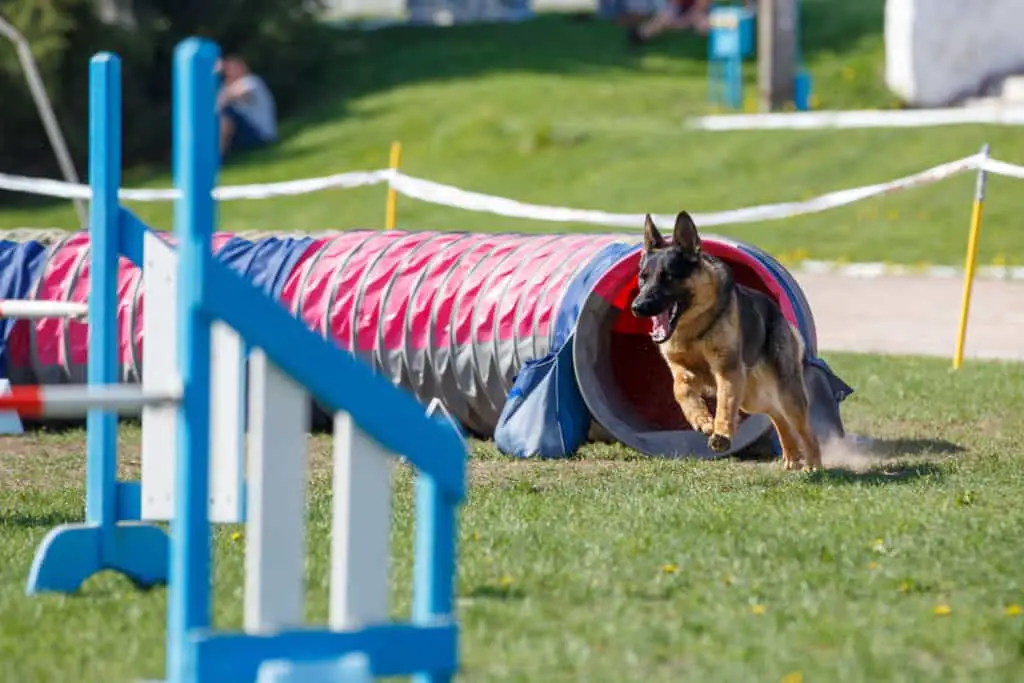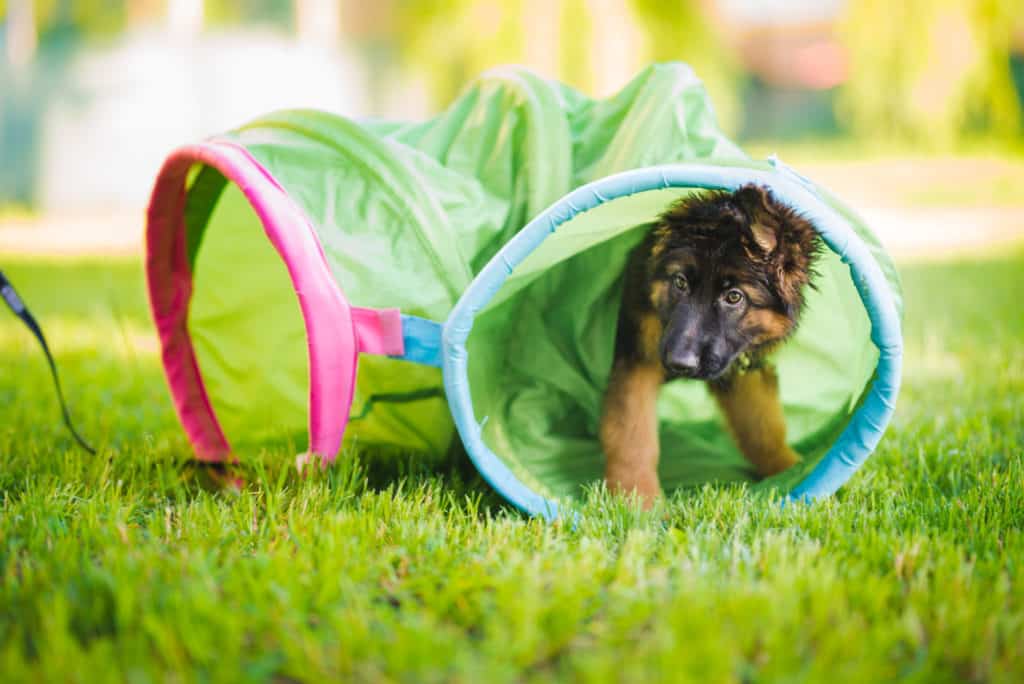Have you ever wondered why you should not get a German Shepherd? Well, the answer is simple; it boils down to time, money, and commitment. Many people love German Shepherds but avoid getting this breed because they find it has too damaging of a reputation.
German Shepherds can be great dogs, but there are many reasons why you would want to avoid them. To better understand why it may not be the dog for you, here’s a list of 13 reasons not to get a German Shepherd:
# 1 – A Purebred German Shepherd Is Prone To Expensive Health Issues
Canine hip dysplasia and eyesight troubles are prevalent among purebred German Shepherd dogs. While eyesight issues may not be deadly, hip dysplasia can be quite physically uncomfortable for a German Shepherd. In addition to hip dysplasia, these dogs can have other hip and joint problems. (Source)
Unfortunately, these health issues can cost anywhere from a few hundred dollars to thousands of dollars:
- $1,000 to $3,000 – Per leg for removal of parts of the hip bone
- $3,500 to $7,000 – Total hip replacement surgery range
- $50 to $200 – Per session for physical or massage therapy
- $40 and $100 – Prescription drug or diet cost
There are a lot of hidden costs to owning a German Shepherd. You have to consider all of the expenses you may incur over the lifetime of your dog. Generally speaking, a large dog costs $14,480, according to the American Kennel Club. Some estimates even put owning a dog at upwards of $90,000 over its lifetime, depending on health issues and general care. (Source)
As a German Shepherd gets older, it is bound to have more health problems. Having the extra cash to keep a German Shepherd comfortable is essential. Unexpectedly large vet bills can definitely be a burden.
You Don’t Have Time To Train A German Shepherd
All German Shepherds take time to train, and training is a big commitment. German Shepherds are large dogs that need training to thrive and be happy. However, they may require more time for training than other breeds, depending on their temperament. Some German Shepherds can have difficulty focusing and listening to commands, but this can easily be trained out if they have a diligent owner.
- Training may take a while– German Shepherds take anywhere between a few weeks to several months to learn new commands.
- Learning never ends – You have to be invested in constantly correcting poor behavior and rewarding good behaviors. Even after a German Shepherd grows into an adult, they will never stop pushing the boundaries of what you consider acceptable and unacceptable behavior.

Why Is Training German Shepherds So Important?
German Shepherds, while they are pack animals by nature, can sometimes keep to themselves. A German Shepherd’s timid behavior around other dogs is mostly due to poor socialization. This ties directly to setting enough time to train and care for your German Shepherd properly. A German Shepherd does not usually get along with most other dogs if training does not start early.
Training makes all the difference in a German Shepherd, as most are not naturally solo animals.
- Unsocialized – Unsocialized German Shepherd can be skittish or territorial.
- Mistreated – German Shepherds with neglectful handlers will want to avoid contact with other dogs and humans.
- Improper training – Training is key to a happy dog. A poorly trained German Shepherd will likely not get along with other dogs because it is taught to act that way, or it has learned other dogs will detract from the attention it gets.
Additionally, if you plan to adopt an older German Shepherd, they may have learned some bad habits that will take even longer to break than outright teaching them from puppyhood.
If you can’t commit to targeted training of a German Shepherd a few times a week over several months, you should probably choose another breed. The key to a happy dog and a happy household is a well-trained pet. Since training lasts a lifetime, you have to be fully committed to correcting behaviors as they pop up as the German Shepherd ages.
A German Shepherd Requires Lots Of Socialization
German Shepherds need to be around new people, places, and pets to thrive like any other dog. German Shepherds have to be socialized to learn to behave. This means you have to spend time showing your German Shepherd new things from a very early age.
Socialization is just like any other skill; if you miss this opportunity when they are puppies, it is much harder to socialize a German Shepherd later in life.
# 3 – German Shepherds Require Lots Of Exercise
In addition to needing plenty of training, German Shepherds require a substantial amount of exercise. These dogs are agile and love to run, jump, work, and play.
Frequent, daily exercise allows a German Shepherd to stay lean and fit. This can also help reduce future health issues. German Shepherds love to run around, so walks and jogs are great ways to get them moving.
# 4 – You Only Want A German Shepherd As A Guard Dog
German Shepherds are said to be aggressive and protective. While guarding and protection is in their nature, aggression is not. German Shepherd temperaments can vary, but they do not only like to guard. In addition to their natural tendency to herd and guard, they need time to exercise and space to run around.
If you are looking for a dog set on guarding and not doing anything else, a German Shepherd is not the right choice. While they are the guarding type, that is not all they do.
# 5 – German Shepherds Will Not Stay Small – They Are Large Dogs
Do not get a German Shepherd if you want a dog that will stay the same size it is as a puppy. German Shepherds are known for being a large breed. These dogs are heavy and big.
The following chart shows the average size of a German Shepherd according to the American Kennel Club:
| Measurement | Avg. Size for Females | Avg. Size for Males |
| Weight | 50 to 70 pounds | 65 to 90 pounds |
| Height | 22 to 24 inches | 24 to 26 inches |
| Length | 36 to 39 inches | 39 to 42.5 inches |
German Shepherds get big and can weigh quite a bit. These dogs are muscular and strong. If you are looking for a dog that stays small, a German Shepherd is not one of them.
# 6 – German Shepherds Require A Significant Time Commitment
Besides the training, German Shepherds require lots of care and attention. Here are some examples of what you are committing to when getting a German Shepherd and the estimated time each activity will take:
- 1 to 3 hours – Yearly visits to the vet
- 30 minutes – Feeding multiple times daily
- 5 to 10 minutes – A constant supply of water needed
- 1 to 2 hours – Must be available to bring outside for exercise and bathroom breaks
- 30 minutes to 1 hour – Playtime is needed daily
- 10 to 15 minutes daily – Constant training is needed. This estimate is a reasonable goal to dedicate to specific training time, yet it is impossible to measure the amount of time you will spend correcting poor behaviors.
- 10 to 15 minutes daily – Grooming needed daily or weekly, as needed
If you are questioning if you have enough time to take care of a German Shepherd, you should seriously consider not getting this breed. You can expect to spend at least 2 hours a day dedicated to taking care of your pet. This will increase if you have a more active dog, who requires more exercise and play, or if you have a mischievous friend that likes to break the rules.
A German Shepherd requires a lot of attention throughout the day and their lifetime. Additionally, if you are also considering a significant change to your daily routine or schedule, it might not be a good idea to get a German Shepherd.
Inadequate Time Commitment Results In An Aggressive German Shepherd
German Shepherds are known as a mixed bag; you never know what you are going to get. These dogs are often seen as aggressive and protective. However, with a dedicated owner, they can be friendly and loving. Most of the time, when a German Shepherd does attack, it is due to the owner’s negligence rather than the dog’s temperament. So having the time to train and handle your German Shepherd is essential.
Here are some examples of German Shepherds who made the news for attacking a person:
- One German Shepherd attacked a teen in Argentina, resulting in 40 stitches.
- Another German Shepherd puppy attacked a young girl in the United Kingdom
- In Florida, several people attacked by a German Shepherd suffered injuries.
- A German Shepherd attacked an elderly woman out on a walk in Berea, Ohio.
Both Texas and California have lawyers dedicated to prosecuting German Shepherd attacks. Because some people tend to think a German Shepherd is ready to attack at any moment, most people avoid them. However, German Shepherds only turn aggressive due to owner negligence. If you cannot commit to training and handling your German Shepherd, you should not get one.
The following are the most critical pieces to building your German Shepherd’s temperament, and they all involve you:
- Playtime – German Shepherds love to play with their owners. If you are not around to play, this can be discouraging, especially if your dog does not know how to play by itself.
- Training – As your German Shepherd learns good and bad behavior, they will strive to make you happy and earn their treats. Without you around, they have no one to give them validation and can easily backslide into old bad habits.
- Body language – Each German Shepherd has an individual set of cues to let you know how they feel. If you are not around to learn these cues, your German Shepherd will not feel close to you at all.
Time Commitment Will Affect Your Travel Plans
If you are the traveling type, then do not waste time getting a German Shepherd. German Shepherds require love, attention, and, as you know by now, a large time commitment. If you are continually traveling, it is hard to provide a German Shepherd with everything they need to thrive as a happy and healthy dog. Your bond with the German Shepherd will be nonexistent.
The following are considerations to take when planning a vacation if you get a German Shepherd:
- Shorter and more expensive vacations – It can be costly to kennel or hire a dog sitter for your German Shepherd during your trip, resulting in you having to schedule shorter trips.
- More planning – When arranging a vacation, you usually only have to worry about the humans in your group, but if you get a German Shepherd, you will have to consider what they will eat, who they may play with, and much more. (Source)
If you spend all your time traveling or worrying about travel plans, little time is left to spend with your German Shepherd. The bond you share with your German Shepherd will be significantly impacted by these interruptions and distractions.
# 7 – German Shepherds Need Space To Run And Play
German Shepherds need lots of exercise. The easiest way for them to get this exercise is in a fenced-in backyard. If you live in an apartment or condominium that does not have a large open space for a dog to run around, this will likely be an issue.
There are a few key components you need besides just a backyard if you want to get a German Shepherd:
- A fence to allow the dog to move freely
- A mix of sunny and shady areas
- Easy access to water
- A monitor while the dog is outside

German Shepherds love to run around. If they do not have space outside, or if you do not live close to a dog park, they will not be at their happiest. If you do not have a backyard, then you may not want to get a German Shepherd.
# 8 – German Shepherds Are High Energy Dogs
German Shepherds require extensive playtime and open space because they are high energy dogs. They will run around and cause a stir. They will run through the house, up and down stairs, on and off furniture, and back and forth in the hallways. These dogs have lots of energy and need an owner who can help them burn some of it off.
One thing to consider is that a German Shepherd’s temperament may change over time. Some dogs are energetic as puppies and slowly become more laid back as they get older. Other dogs are always energetic, and some are more laid back their entire lives.
If you cannot find the time to play with them and expend some of their energy, especially if they are inside most of the day, you will end up with one rowdy German Shepherd.
# 9 – German Shepherds Are A Messy Breed
German Shepherds, like all dogs, can be messy. They shed, drool, pee, poop, and slobber all over the place. Not to mention they easily track dirt, mud, and debris into the house. All this requires you to clean more often.
Besides shedding dog hair constantly, dogs will drool all over the furniture and leave their toys all around the house. Additionally, if you are interested in a German Shepherd puppy, you are in for a big series of messes, from potty training to the sloppiness that comes with innocent dog curiosity and mischief, they sure are a handful.
# 10 – German Shepherds Don’t Always Want To Cuddle
German Shepherds are typically not as snuggly as other breeds. However, this is very dependent on each dog’s temperament. Some dogs may love to cuddle, but in general, German Shepherds are not the cuddling type. This is only exacerbated by their large size, which makes cuddling difficult.
If you are a stickler about your furniture and physical space, then this may be an excellent option for you. However, if you want a dog that will cuddle you, try getting a smaller lap dog or a lower energy dog.
# 11 – German Shepherds May Scare Your Children
This breed is protective and large, which can be a terrible mix for having small children around. German Shepherds can resemble the big, bad wolf and may scare your kids. A scared child may act out and cause your German Shepherd to try to protect itself.
Here are some reasons to be cautious with a German Shepherd around your children:
- Sharp teeth – These dogs can bite and chew through many things.
- Big size – German Shepherds will run your child over, and they can be so big they can knock over grown adults if you are not careful.
- Loud bark – When a dog gets excited or scared, it will bark. German Shepherd barks are noisy and can be distressing to small children.
- Big ears – These dogs closely resemble a wolf. This can scare your children and cause a whole scene because German Shepherds look menacing.
While many German Shepherds love children, make sure your child feels safe around these large dogs before bringing one home. Read more in this article: Are German Shepherd Safe Around Babies?
# 12 – You Have A Very Busy Schedule
If you are the type of person who is always on the move and has a hectic schedule, then a German Shepherd would not match your lifestyle. Busy schedules make owning a German Shepherd challenging. They require tons of attention and need an owner who is patient and flexible.
Here is why a busy schedule prevents you from being able to care for a German Shepherd:
- You come home at odd hours frequently – This makes it hard for a German Shepherd to adapt to a schedule.
- You work long shifts – Being away from home is common among dog owners, but certain dog breeds do not take well to being left alone for long periods.
- You love having the freedom of a flexible schedule – With a German Shepherd, you must operate on a stricter schedule because you have to get home timely to feed and let your German Shepherd out. You do not want to come home to accidents or messes.

Having a busy schedule makes it challenging to meet the needs of a German Shepherd. You are not home as often to play with and exercise your German Shepherd. You also can’t be around to manage their messes. Thus, if you are someone with a hectic, busy schedule, getting a German Shepherd is not a good idea.
# 13 – You Don’t Live In A German Shepherd Friendly Area
Because German Shepherds are big dogs and have a questionable reputation, they are not welcome everywhere. Many neighborhoods and housing associations have restrictions on the types of breeds they allow to live in the area. Rent provides a comprehensive record of breed restrictions, which is consolidated below as these points relate to German Shepherds.
Here are a few different types of breed restrictions you may encounter when looking for a new place to live or adding a German Shepherd to your household:
- Size – Many places will not accept large dogs on site. This eliminates the option of you getting a German Shepherd unless you plan to move.
- Age – Not all landlords will allow German Shepherd puppies. They tend to be more destructive and noisier.
- Dangerous breeds – Many times, these restrictions are set by landlords; however, some counties or towns set them by law. German Shepherds may fall into the ‘aggressive dog’ category, depending on your landlord’s, county’s, or town’s definition.
Check all rules set forth by your landlord or housing association to make sure German Shepherds are allowed in your community. You do not want to incur any fines or have the potential to be evicted because of your new dog. (Source)
There Are Many Reasons Not To Get A German Shepherd
The most significant factors to consider if you want to get a German Shepherd are time and money. You have to be committed for the long haul, as German Shepherds can live for up to ten years, sometimes even longer.
Additionally, you must be aware of a German Shepherd’s temperament and know that not all dogs are alike. Their attitude can change from day to day. German Shepherds are incredible animals, but they might not make the best pet for your lifestyle.
